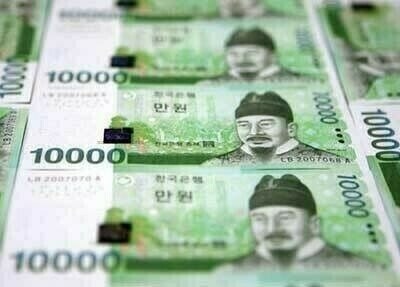
BENGALURU: Emerging Asian currencies and equities joined a rally in global markets on Thursday, after the US Federal Reserve indicated that its tightening cycle is likely over and flagged rate cuts next year, bolstering investor appetite for riskier assets.
South Korea’s won, Thailand’s baht, and Indonesia’s rupiah rose more than 1% each. The Malaysian ringgit advanced 0.9%.
Stocks in South Korea and Thailand jumped more than 1% each.
Federal Reserve Chair Jerome Powell said the historic monetary tightening is likely over as inflation falls faster than expected, with a discussion of cuts in borrowing costs coming “into view.” Markets are now pricing in around a 75% chance of a rate cut in March, according to CME FedWatch tool, compared with 54% a week earlier.
With expectations of lower US yields, the rate differential between US and Asia rates will narrow, benefiting higher yielding Asian currencies, according to Ray Sharma-Ong, investment director of multi-asset at fund manager abrdn.
“We expect currencies such as KRW, TWD and THB” to perform well, he said, referring to the South Korean won, Taiwan dollar and Thai baht. “We also expect Asia equity markets to improve as US growth moderates while Asia growth remains resilient.”
The Philippine peso jumped 0.8% and stocks climbed 2.2% to its highest level since late-September ahead of a policy decision from the Bangko Sentral ng Pilipinas (BSP), which is widely expected to leave interest rates unchanged.
The country’s central bank had said last week that it was necessary to keep monetary policy settings “sufficiently tight”, despite easing inflation in November, highlighting its wariness on price pressures.
“One factor that could be supportive for PHP, however, would be BSP’s consistent hawkish commentary.
A rate hike by the BSP at a time of global easing could be one reason we would see PHP appreciate more aggressively than our baseline forecast,” Nicholas Mapa, senior economist, at ING in the Philippines wrote.
The Taiwanese central bank is also expected to leave policy rates unchanged later on Thursday. The Taiwan dollar advanced 0.9% while equities climbed 0.8%.
Investors in emerging Asian assets also kept watch on developments in Argentina where its government allowed its peso to plunge over 50%, cut energy subsidies and cancel public works tenders as part of an economic shock therapy aimed at fixing the South American country’s worst crisis in decades.
